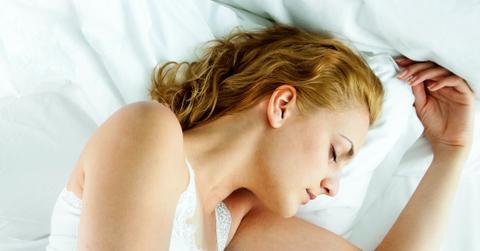
Don't Panic! Coronasomnia — Pandemic-Induced Insomnia — Is A Real Thing: 5 Ways To Change Your Sleeping Habits
"I'm having trouble sleeping" has become a common saying amid the ongoing COVID-19 pandemic. In fact, the positive correlation between insomnia and COVID-19 has led one doctor to name the phenomenon "coronasomnia." According to a report in Healthline, "Pharmaceutical sleep prescriptions have increased 20 percent over the last year."
PEOPLE recently ran an article about a study done by OnePoll that looked at Americans who said they haven't slept well since their teen years. Most survey respondents said they weren't getting more than five hours of sleep each night. The study "examined the possible long-term effects of these different types of 'sleepless years.'" Out of the participants, six in 10 said they had been having even more trouble sleeping since the pandemic began.
There are several good reasons why COVID-19 is inducing insomnia. For one, the pandemic has caused a lot of stress, and stress leads to the release of adrenaline and cortisol, according to Medalie, creator of DrLullaby. “This then causes the heart rate and blood pressure to increase, putting the system into fight-or-flight mode," she explains in Healthline. And of course, if you are in fight-or-flight mode, you will have difficulty dosing off.
Other reasons as to why COVID-19 is triggering insomnia is that changing routines disrupts our sleep cycles and blue light from late night TV binges keeps our bodies from producing melatonin.
If you are among the throngs of people suffering from insomnia during the COVID era, there are some things that can help.
Here are five ways you can be proactive and, hopefully, get that good night's rest you so desperately need.
Do A Guided Meditation
If your head hits the pillow at night, and you immediately start feeling anxious, doing a guided meditation might help, according to Dr. Barone, who also suggests using a weighted blanket.
Go Outside In The Morning
Getting out into the sun, especially in the morning, has many benefits that will help you sleep better at night, according to an article by Dr. Brandon Peters in VeryWell Health. Among them are the fact that morning sun will help you produce a hormone called serotonin that helps you sleep, and it will also help you produce cortisol in the early part of the day when you need it, rather than at night when you need to calm down and fall asleep.
Exercise Daily
According to an article in Johns Hopkins Medicine, "moderate aerobic exercise increases the amount of slow wave sleep you get. Slow wave sleep refers to deep sleep, where the brain and body have a chance to rejuvenate." The article recommends "listening to your body" to determine what time of day is the best to exercise for optimal sleep. It also says that you will experience immediate sleep benefits from exercising for just 30 minutes a day.
Establish A Daily Routine
Babies need routine, so why wouldn't you? According to Elizabeth Grojean, who founded the weighted blanket company Baloo Living, you can reduce insomnia by "scheduling your work time, exercise, leisure activities, and bedtime to create separation between the different parts of your day and support a consistent sleep cycle."
Practice Good Sleep Hygeine
"Your sleep hygiene affects your quality of sleep, which in turn, changes how you feel all day. Fail to get this part of your sleeping routine right, and you might struggle with everything from your mental health, to your productivity levels," Siestio reported. Sleep hygiene includes any rituals or routines you engage in right before you go to bed. One way you can practice good sleep hygiene is by making your room dark, cool and cozy before going to sleep or simply don't drink caffeine before hitting the hay.
If you're experiencing insomnia, it is paramount that you put at least some of these habits into practice starting today. After all, you deserve a good night's sleep in these crazy times!
